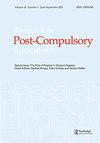The advantages of visual methods in exploring hidden subjectivities in post-compulsory education
IF 0.9
Q3 EDUCATION & EDUCATIONAL RESEARCH
引用次数: 1
Abstract
ABSTRACT This article exemplifies the advantages that researchers have if they apply visual methods and in particular photo-elicitation to qualitative research. The research context is post-compulsory education with the field of study being a new vocational degree programme, and the theoretical content of the article draws on the work of Goffman, alongside theories of literacy as social practice. It is interesting that the policy documents that are framing new vocational degrees are texts written in particular ways and that in the UK these texts are informed by political and economic agendas. However, the texts that have given rise to new vocational degree programmes do not appear to necessarily align with the rich subjective practices which are occurring within this form of post-compulsory education. The research that is presented in this article from selected students and academics who are working on a particular vocational degree reveals profound interpretations of the purpose of new vocational degrees. The imaginative and creative images that are captured by the application of photo-elicitation to this study reveal a fascinating interplay between the policy texts and the subjective interpretations of the purpose of post-compulsory education.视觉方法在探索义务教育后隐性主体性中的优势
本文举例说明了研究人员在定性研究中应用视觉方法,特别是照片启发的优势。研究背景是后义务教育,研究领域是一种新的职业学位课程,文章的理论内容借鉴了戈夫曼的工作,以及作为社会实践的识字理论。有趣的是,制定新职业学位的政策文件是以特定方式编写的文本,而在英国,这些文本是由政治和经济议程决定的。然而,产生新的职业学位课程的教材似乎并不一定与这种形式的后义务教育中出现的丰富的主观实践相一致。本文中介绍的研究来自于正在攻读特定职业学位的学生和学者,这些研究揭示了对新职业学位目的的深刻解读。在本研究中运用图片启发法捕捉到的富有想象力和创造性的图像揭示了政策文本与对后义务教育目的的主观解释之间令人着迷的相互作用。
本文章由计算机程序翻译,如有差异,请以英文原文为准。
求助全文
约1分钟内获得全文
求助全文
来源期刊

Research in Post-Compulsory Education
EDUCATION & EDUCATIONAL RESEARCH-
CiteScore
1.30
自引率
14.30%
发文量
31
期刊介绍:
Throughout the world, there is a growing awareness of the significance of vocational and post-compulsory education and training systems. The majority of countries are working hard to develop their provision, recognising the importance of post-compulsory education in providing educated and skilled people in sufficient numbers at appropriate levels to assist economic and social development. Research in Post-Compulsory Education, sponsored by the United Kingdom"s Further Education Research Association (FERA), recognises the need for more international research and analysis and the generation of relevant theory in order to identify policy needs and trends as well as priorities in this growing area.
 求助内容:
求助内容: 应助结果提醒方式:
应助结果提醒方式:


